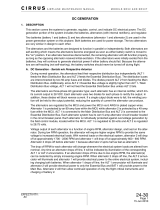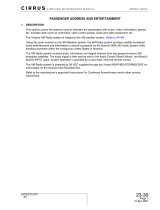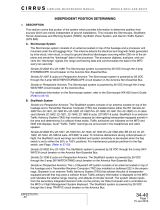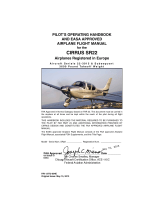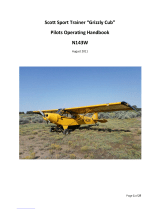Page is loading ...

AIRPLANE INFORMATION MANUAL
for the
CIRRUS DESIGN SR20
Aircraft Serials 1148 thru 1267 and Aircraft Serials
1005 thru 1147 after 3000 Pound Gross Weight
Modification
At the time of issuance, this Information Manual was harmo-
nized with the SR20 Pilot's Operating Handbook Rev A10 (P/N
11934-002), and will not be kept current.
Therefore, this Information Manual is for reference only and can-
not be used as a substitute for the official Pilot's Operating
Handbook and FAA Approved Airplane Flight Manual.
Information Manual
P/N 13999-002 September 2011

Copyright © 2011 - All Rights Reserved
Cirrus Design Corporation
4515 Taylor Circle
Duluth, MN 55811

P/N 13999-002 Info Manual 1-1
Cirrus Design Section 1
SR20 General
Section 1
General
Table of Contents
Introduction .....................................................................................1-3
The Airplane....................................................................................1-6
Engine.......................................................................................... 1-6
Propeller ......................................................................................1-6
Fuel..............................................................................................1-7
Oil ...............................................................................................1-7
Maximum Certificated Weights ....................................................1-7
Cabin and Entry Dimensions .......................................................1-7
Baggage Spaces and Entry Dimensions .....................................1-7
Specific Loadings.........................................................................1-7
Symbols, Abbreviations and Terminology.......................................1-8
General Airspeed Terminology and Symbols ..............................1-8
Meteorological Terminology......................................................... 1-9
Engine Power Terminology........................................................1-10
Performance and Flight Planning Terminology..........................1-10
Weight and Balance Terminology..............................................1-11
September 2011

1-2 P/N 13999-002 Info Manual
Section 1 Cirrus Design
General SR20
Intentionally Left Blank
September 2011

P/N 13999-002 Info Manual 1-3
Cirrus Design Section 1
SR20 General
Introduction
This section contains information of general interest to pilots and
owners. You will find the information useful in acquainting yourself with
the airplane, as well as in loading, fueling, sheltering, and handling the
airplane during ground operations. Additionally, this section contains
definitions or explanations of symbols, abbreviations, and terminology
used throughout this handbook.
• Note •
For specific information regarding the organization of this
Handbook, revisions, supplements, and procedures to be
used to obtain revision service for this handbook, refer to the
“Foreword” immediately following the title page
September 2011

1-4 P/N 13999-002 Info Manual
Section 1 Cirrus Design
General SR20
Figure 1-1
76" 2-BLADE
74" 3-BLADE
35.5'
11.0'
9.2'
7"
26.0'
SR20_FM01_1004A
NOTE:
• Wing
s
pa
n includes
position and strobe lights.
• Prop ground clearance at
3000 lb - 7" (2 blade),
8" (3 blade).
• Wing Area = 135.2 sq. ft.
Airplane Three View
September 2011

P/N 13999-002 Info Manual 1-5
Cirrus Design Section 1
SR20 General
11"23'
11"
9'
SR20_FM01_1002
GROUND TURNING CLEARANCE
TURNING RADII ARE CALCULATED USING ONE BRAKE AND
PARTIAL POWER. ACTUAL TURNING RADIUS MAY VARY AS
MUCH AS THREE FEET.
-RADIUS FOR WING TIP
-RADIUS FOR INSIDE GEAR
6"
-RADIUS FOR OUTSIDE GEAR
-RADIUS FOR NOSE GEAR
2"
12'
Figure 1-2
Turning Radius
September 2011

1-6 P/N 13999-002 Info Manual
Section 1 Cirrus Design
General SR20
The Airplane
Engine
Number of Engines..............................................................................1
Number of Cylinders............................................................................6
Engine Manufacturer ........................................... Teledyne Continental
Engine Model........................................................................ IO-360-ES
Fuel Metering.................................................................... Fuel Injected
Engine Cooling ..................................................................... Air Cooled
Engine Type....................................Horizontally Opposed, Direct Drive
Horsepower Rating................................................ 200 hp @ 2700 rpm
Propeller
Hartzell
Propeller Type.............................................................. Constant Speed
Two-Blade Propeller:
Model Number ...................................................BHC-J2YF-1BF/F7694
Diameter .............................................................76.0” (73.0” Minimum)
Three-Blade Propeller:
Model Number ...............................................PHC-J3YF-1MF/F7392-1
Diameter .............................................................74.0” (72.0” Minimum)
Model Number ............................................... PHC-J3YF-1RF/F7392-1
Diameter .............................................................74.0” (72.0” Minimum)
September 2011

P/N 13999-002 Info Manual 1-7
Cirrus Design Section 1
SR20 General
Fuel
Total Capacity.............................................60.5 U.S. Gallons (229.0 L)
Total Usable...................................................56 U.S. Gallons (212.0 L)
Approved Fuel Grades:
100 LL Grade Aviation Fuel (Blue)
100 (Formerly 100/130) Grade Aviation Fuel (Green)
Oil
Oil Capacity (Sump) ............................................. 8 U.S. Quarts (7.6 L)
Oil Grades:
All Temperatures ............................................SAE 15W-50 or 20W-50
Below 40 ° F (4° C) ................................................. SAE 30 or 10W-30
Above 40 ° F (4° C) ...................................................................SAE 50
Maximum Certificated Weights
Maximum Gross for Takeoff...................................... 3000 lb (1361 Kg)
Maximum Landing Weight........................................ 2900 lb (1315 Kg)
Maximum Baggage Compartment Loading.................... 130 lb (59 Kg)
Standard Empty Weight ............................................. 2050 lb (930 Kg)
Maximum Useful Load.................................................. 950 lb (431 Kg)
Full Fuel Payload.......................................................... 622 lb (282 Kg)
Cabin and Entry Dimensions
Dimensions of the cabin interior and entry door openings are
illustrated in detail in Section 6.
Baggage Spaces and Entry Dimensions
Dimensions of the baggage area and baggage door opening are
illustrated in detail in Section 6.
Specific Loadings
Wing Loading .................................................... 22.2 lb per square foot
Power Loading................................................................. 15.0 lb per hp
September 2011

1-8 P/N 13999-002 Info Manual
Section 1 Cirrus Design
General SR20
Symbols, Abbreviations and Terminology
General Airspeed Terminology and Symbols
KCAS Knots Calibrated Airspeed is the indicated airspeed
corrected for position and instrument error. Calibrated
airspeed is equal to true airspeed in standard atmosphere at
sea level.
KIAS Knots Indicated Airspeed is the speed shown on the
airspeed indicator. The IAS values published in this
handbook assume no instrument error.
KTAS Knots True Airspeed is the airspeed expressed in knots
relative to undisturbed air which is KCAS corrected for
altitude and temperature.
V
G
Best Glide Speed is the speed at which the greatest flight
distance is attained per unit of altitude lost with power off.
V
O
Operating Maneuvering Speed is the maximum speed at
which application of full control movement will not overstress
the airplane.
V
FE
Maximum Flap Extended Speed is the highest speed
permissible with wing flaps in a prescribed extended position.
V
NO
Maximum Structural Cruising Speed is the speed that
should not be exceeded except in smooth air, and then only
with caution.
V
NE
Never Exceed Speed is the speed that may not be exceeded
at any time.
V
PD
Maximum Demonstrated Parachute Deployment Speed is
the maximum speed at which parachute deployment has
been demonstrated.
V
S
Stalling Speed is minimum steady flight speed at which the
aircraft is controllable.
V
S
50%
Stalling Speed is minimum steady flight speed at which the
aircraft is controllable with 50% flaps.
September 2011

P/N 13999-002 Info Manual 1-9
Cirrus Design Section 1
SR20 General
Meteorological Terminology
V
SO
Stalling Speed is the minimum steady flight speed at which
the aircraft is controllable in the landing configuration (100%
flaps) at the most unfavorable weight and balance.
V
X
Best Angle of Climb Speed is the speed at which the
airplane will obtain the highest altitude in a given horizontal
distance. The best angle-of-climb speed normally increases
slightly with altitude.
V
Y
Best Rate of Climb Speed is the speed at which the
airplane will obtain the maximum increase in altitude per unit
of time. The best rate-of-climb speed decreases slightly with
altitude.
IMC Instrument Meteorological Conditions are meteorological
conditions expressed in terms of visibility, distance from
cloud, and ceiling less than the minima for visual flight
defined in FAR 91.155.
ISA International Standard Atmosphere (standard day) is an
atmosphere where (1) the air is a dry perfect gas, (2) the
temperature at sea level is 15° C, (3) the pressure at sea
level is 29.92 in.Hg (1013.2 millibars), and (4) the
temperature gradient from sea level to the altitude at which
the temperature is -56.5° C is -0.00198° C per foot and zero
above that altitude.
MSL Mean Sea Level is the average height of the surface of the
sea for all stages of tide. In this Handbook, altitude given as
MSL is the altitude above the mean sea level. It is the
altitude read from the altimeter when the altimeter’s
barometric adjustment has been set to the altimeter setting
obtained from ground meteorological sources.
OAT Outside Air Temperature is the free air static temperature
obtained from inflight temperature indications or from ground
meteorological sources. It is expressed in either degrees
Celsius or degrees Fahrenheit.
September 2011

1-10 P/N 13999-002 Info Manual
Section 1 Cirrus Design
General SR20
Engine Power Terminology
Performance and Flight Planning Terminology
• Pressure Altitude is the altitude read from the altimeter
when the altimeter’s barometric adjustment has been set to
29.92 in.Hg (1013 mb) corrected for position and instrument
error. In this Handbook, altimeter instrument errors are
assumed to be zero.
• Standard Temperature is the temperature that would be
found at a given pressure altitude in the standard
atmosphere. It is 15° C (59° F) at sea level pressure altitude
and decreases approximately 2° C (3.6° F) for each 1000
feet of altitude increase. See ISA definition.
HP Horsepower is the power developed by the engine.
MCP Maximum Continuous Power is the maximum power that
can be used continuously.
MAP Manifold Pressure is the pressure measured in the
engine’s induction system expressed as in. Hg.
RPM Revolutions Per Minute is engine rotational speed.
• Static RPM is RPM attained during a full-throttle engine
runup when the airplane is on the ground and stationary.
gOne “g” is a quantity of acceleration equal to that of earth’s
gravity.
• Demonstrated Crosswind Velocity is the velocity of the
crosswind component for which adequate control of the
airplane during taxi, takeoff, and landing was actually
demonstrated during certification testing. Demonstrated
crosswind is not considered to be limiting.
• Service Ceiling is the maximum altitude at which the
aircraft at maximum weight has the capability of climbing at
a rate of 100 feet per minute.
GPH Gallons Per Hour is the amount of fuel (in gallons)
consumed by the aircraft per hour.
September 2011

P/N 13999-002 Info Manual 1-11
Cirrus Design Section 1
SR20 General
Weight and Balance Terminology
NMPG
Nautical Miles Per Gallon is the distance (in nautical miles)
which can be expected per gallon of fuel consumed at a
specific engine power setting and/or flight configuration.
• Unusable Fuel is the quantity of fuel that cannot be safely
used in flight.
• Usable Fuel is the fuel available for flight planning.
c.g. Center of Gravity is the point at which an airplane would
balance if suspended. Its distance from the reference datum
is found by dividing the total moment by the total weight of
the airplane.
•Arm is the horizontal distance from the reference datum to
the center of gravity (c.g.) of an item. The airplane’s arm is
obtained by adding the airplane’s individual moments and
dividing the sum by the total weight.
• Basic Empty Weight is the actual weight of the airplane
including all operating equipment that has a fixed location in
the airplane. The basic empty weight includes the weight of
unusable fuel and full oil.
MAC Mean Aerodynamic Chord is the chord drawn through the
centroid of the wing plan area.
LEMAC
Leading Edge of Mean Aerodynamic Chord is the forward
edge of MAC given in inches aft of the reference datum
(fuselage station).
• Maximum Gross Weight is the maximum permissible
weight of the airplane and its contents as listed in the aircraft
specifications.
•Moment is the product of the weight of an item multiplied by
its arm.
•Useful Load is the basic empty weight subtracted from the
maximum weight of the aircraft. It is the maximum allowable
combined weight of pilot, passengers, fuel and baggage.
September 2011

1-12 P/N 13999-002 Info Manual
Section 1 Cirrus Design
General SR20
• Station is a location along the airplane fuselage measured
in inches from the reference datum and expressed as a
number. For example: A point 123 inches aft of the reference
datum is Fuselage Station 123.0 (FS 123).
• Reference Datum is an imaginary vertical plane from which
all horizontal distances are measured for balance purposes.
•Tare is the weight of all items used to hold or position the
airplane on the scales for weighing. Tare includes blocks,
shims, and chocks. Tare weight must be subtracted from the
associated scale reading.
September 2011

P/N 13999-002 Info Manual 2-1
Cirrus Design Section 2
SR20 Limitations
Section 2
Limitations
Table of Contents
Introduction .....................................................................................2-3
Certification Status..........................................................................2-3
Airspeed Limitations........................................................................2-4
Airspeed Indicator Markings ...........................................................2-5
Power Plant Limitations ..................................................................2-6
Engine.......................................................................................... 2-6
Propeller ......................................................................................2-7
Weight Limits ...............................................................................2-7
Instrument Markings ....................................................................... 2-8
Center of Gravity Limits ..................................................................2-9
Maneuver Limits............................................................................2-10
Flight Load Factor Limits............................................................... 2-10
Minimum Flight Crew ....................................................................2-10
Kinds of Operation ........................................................................2-11
Kinds of Operation Equipment List ............................................2-11
Icing ........................................................................................... 2-14
Runway Surface ........................................................................ 2-14
Taxi Power.................................................................................2-15
Instrument Procedures ..............................................................2-15
Fuel Limits.....................................................................................2-15
Altitude Limits................................................................................2-15
Environmental Conditions ............................................................. 2-15
Maximum Occupancy ...................................................................2-15
Systems and Equipment Limits.....................................................2-16
Cirrus Airframe Parachute System (CAPS) ...............................2-16
Multi-Function Display ...............................................................2-16
Oxygen System .........................................................................2-17
Inflatable Restraint System........................................................2-17
Flap Limitations.......................................................................... 2-17
Paint........................................................................................... 2-17
Other Limitations...........................................................................2-18
Smoking.....................................................................................2-18
Placards ........................................................................................2-19
September 2011

2-2 P/N 13999-002 Info Manual
Section 2 Cirrus Design
Limitations SR20
September 2011
Intentionally Left Blank

P/N 13999-002 Info Manual 2-3
Cirrus Design Section 2
SR20 Limitations
Introduction
• Note •
Limitations associated with optional equipment are not
described in this section. For optional equipment limitations,
refer to Section 9, Supplements
The limitations included in this Section of the Pilot’s Operating
Handbook (POH) are approved by the Federal Aviation Administration.
This section provides operating limitations, instrument markings and
basic placards required by regulation and necessary for the safe
operation of the SR20 and its standard systems and equipment. Refer
to Section 9 of this handbook for amended operating limitations for
airplanes equipped with optional equipment. Compliance with the
operating limitations in this section and in Section 9 is required by
Federal Aviation Regulations.
Certification Status
The Cirrus SR20 is certificated under the requirements of Federal
Aviation Regulations (FAR) Part 23 as documented by FAA Type
Certificate TC A00009CH.
September 2011

2-4 P/N 13999-002 Info Manual
Section 2 Cirrus Design
Limitations SR20
Figure 2-1
Airspeed Limitations
The indicated airspeeds in the following table are based upon Section
5 Airspeed Calibrations using the normal static source. When using
the alternate static source, allow for the airspeed calibration variations
between the normal and alternate static sources.
Speed KIAS KCAS Remarks
V
NE
200 200 Never Exceed Speed is the speed limit
that may not be exceeded at any time.
V
NO
165 165 Maximum Structural Cruising Speed is
the speed that should not be exceeded
except in smooth air, and then only with
caution.
V
O
3000 Lb
2600 Lb
2300 Lb
131
122
114
131
123
115
Operating Maneuvering Speed is the
maximum speed at which full control
travel may be used. Below this speed the
airplane stalls before limit loads are
reached. Above this speed, full control
movements can damage the airplane.
V
FE
50% Flaps
100% Flaps
120
100
120
101
Maximum Flap Extended Speed is the
highest speed permissible with wing
flaps extended.
V
PD
135 135 Maximum Demonstrated Parachute
Deployment Speed is the maximum
speed at which parachute deployment
has been demonstrated.
Airspeed Limits
September 2011

P/N 13999-002 Info Manual 2-5
Cirrus Design Section 2
SR20 Limitations
Airspeed Indicator Markings
The airspeed indicator markings are based upon Section 5 Airspeed
Calibrations using the normal static source. When using the alternate
static source, allow for the airspeed calibration variations between the
normal and alternate static sources.
Marking
Value
(KIAS)
Remarks
White
Arc
56 - 100 Full Flap Operating Range. Lower limit is the most
adverse stall speed in the landing configuration.
Upper limit is the maximum speed permissible with
flaps extended.
Green
Arc
65 - 165 Normal Operating Range. Lower limit is the
maximum weight stall at most forward C.G. with
flaps retracted. Upper limit is the maximum structural
cruising speed.
Ye l l o w
Arc
165 - 200 Caution Range. Operations must be conducted with
caution and only in smooth air.
Red Line 200 Never exceed speed. Maximum speed for all
operations.
Figure 2-2
Airspeed Indicator Markings
September 2011

2-6 P/N 13999-002 Info Manual
Section 2 Cirrus Design
Limitations SR20
Power Plant Limitations
Engine
Teledyne Continental ............................................................IO-360-ES
Power Rating ........................................................ 200 hp @ 2700 rpm
Maximum RPM .......................................................................2700 rpm
Oil:
Oil Temperature.................................... 240° F (115° C) maximum
Oil Pressure:
Minimum................................................................................ 10 psi
Maximum............................................................................. 100 psi
Approved Oils:
Engine Break-In: For first 25 hours of operation or until oil
consumption stabilizes use straight mineral oil conforming to MIL-
L-6082. If engine oil must be added to the factory installed oil, add
only MIL-L-6082 straight mineral oil.
After Engine Break-In: Use only oils conforming to Teledyne
Continental Specification MHS-24 (Ashless Dispersant Lubrication
Oil) or MHS-25 (Synthetic Lubrication Oil). Refer to Section 8 - Oil
Servicing. Oil viscosity range as follows:
All Temperatures ..............................................15W-50 or 20W-50
Above 40° F (4° C).............................................. SAE 50 or 20W50
Below 40° F (4° C) ................. SAE 30, 10W-30, 15W50, or 20W50
Fuel Grade ................Aviation Grade 100 LL (Blue) or 100 (green)
• Note •
Refer to General Limitations – Fuel Limits in this section for
operational limitations regarding fuel and fuel storage.
September 2011
/




